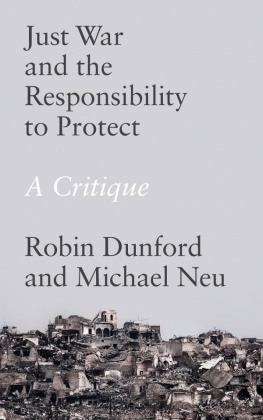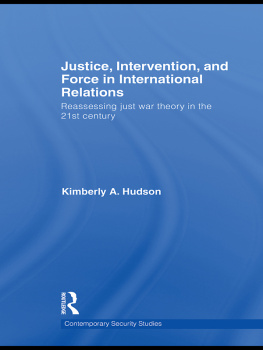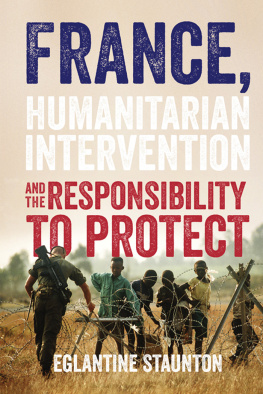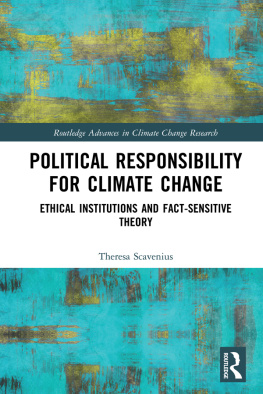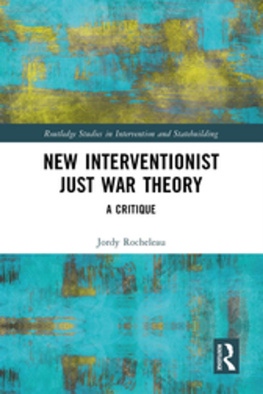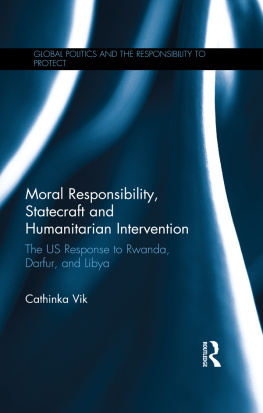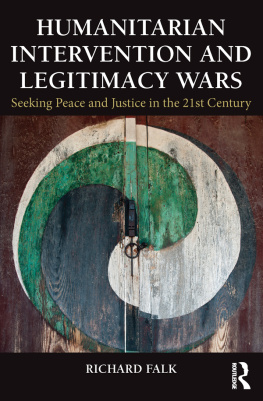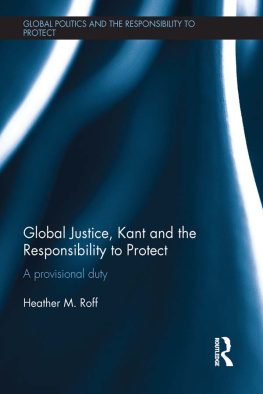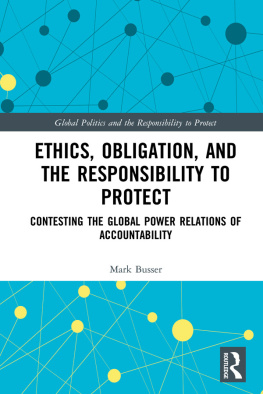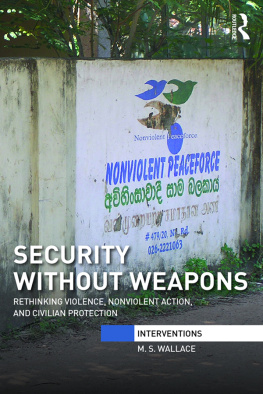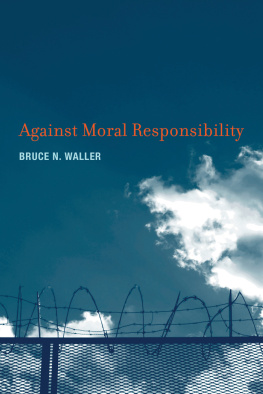
ABOUT THE AUTHORS
Robin Dunford and Michael Neu are both members of the Centre for Applied Philosophy, Politics and Ethics at the University of Brighton. They teach on degrees in War; Philosophy, Politics and Ethics; and Globalisation. Neus previous book, Just Liberal Violence , was published in 2017; Dunfords The Politics of Transnational Peasant Struggle was published in 2016.
JUST WAR AND THE
RESPONSIBILITY TO PROTECT
A CRITIQUE
Robin Dunford and Michael Neu

Just War and the Responsibility to Protect: A Critique was first published in 2019 by Zed Books Ltd, The Foundry, 17 Oval Way, London SE11 5RR, UK.
www.zedbooks.net
Copyright Robin Dunford and Michael Neu 2019
The right of Robin Dunford and Michael Neu to be identified as the authors of this work has been asserted by them in accordance with the Copyright, Designs and Patents Act, 1988
Typeset in Plantin and Kievit by Swales & Willis Ltd, Exeter, Devon
Index by Robin Dunford and Michael Neu
Cover design by Steve Leard
Cover photo Tommy Trenchard, Panos Pictures
All rights reserved. No part of this publication may be reproduced, stored in a retrieval system or transmitted in any form or by any means, electronic, mechanical, photocopying or otherwise, without the prior permission of Zed Books Ltd.
A catalogue record for this book is available from the British Library
ISBN 978-1-78699-151-5 hb
ISBN 978-1-78699-150-8 pb
ISBN 978-1-78699-152-2 pdf
ISBN 978-1-78699-153-9 epub
ISBN 978-1-78699-154-6 mobi
CONTENTS
| ICISS | International Commission on Intervention and State Sovereignty |
| NATO | North Atlantic Treaty Organization |
| R2P | Responsibility to Protect |
| SAP | Structural Adjustment Programme |
| UN | United Nations |
We would like to express our gratitude to a number of friends and colleagues who have made important contributions to this book. In particular, we thank Bob Brecher and Vicky Margree for insightful comments. Vasilis Leontisis has always been there, and the prospect of him giving us the sh*t of our lives has always kept us motivated. We had valuable conversations with Cathy Bergin, Garrett Wallace Brown, Zeina Maasri, Mark McGovern, Paul Reynolds and James Souter. Our former student Rob Somerton-Jones also provided useful comments on our Libya chapter. Many other students and colleagues have asked some great questions in response to talks we gave on a number of occasions beginning with a talk on Just Killing Gone Wrong in a lecture theatre packed with undergraduates a couple of years ago. It was around this time that we first spoke to Ken Barlow, who has been a friendly, understanding and supportive editor throughout. The Humanities Programme and the Centre for Applied Philosophy, Politics and Ethics has, as ever, been a supportive and stimulating environment in which to write a book. This is in many ways thanks to Paddy Maguire, who has been a fabulous Head of School and should never have been allowed to retire.
On a more personal note, wed both like to thank our families. Michael has worked on this book with his family under more strain than any of us would have imagined just over a year ago, but it is well documented that we are not to be defeated. Robin would like to thank Annabel Wyatt in particular, whose love and support has been a blissful relief throughout.
P.S. Ich wrde Euch dieses Buch ja widmen, aber es passt einfach nicht zu Euch. Warten wir lieber aufs nchste: ber die Freundschaft.
In January 2017 , eastern Aleppo in Syria was under siege. President Bashar al-Assads forces had blocked all exit routes from the area. Russian planes provided air support, bombing rebel areas and killing civilians in the process. Aid was blocked, leaving people in the city starving and dying. Rebel fighters would not let civilians leave, knowing that they could be used as a shield from the Syrian regime. Reports from the area suggested that mass human rights violations were committed on all sides. This was but the latest episode in a conflict that, at the time of writing, has cost at least , lives and displaced half of Syrias population.
Speaking to the United Kingdom (UK) House of Commons as the siege was unfolding, Conservative Member of Parliament George Osborne (in ) said that events in Aleppo were created by a vacuum, a vacuum of Western leadership, of American leadership, British leadership. The events highlighted, he continued, the price of not intervening. Osbornes speech is reflective of the broader way in which mass atrocity situations are framed in public discourse, contemporary just war thinking and the Responsibility to Protect (RP) the international commitment to prevent and respond to mass atrocities. It is a framing that imagines that crises like the one in eastern Aleppo simply crop up. The international community is not seen to be involved in the emergence of such crises. Or, when the involvement of international actors is recognised, focus tends to fall on villainous actors like Russia, Iran and transnational Islamist militias, who are considered to stoke the flames after crises emerge. The good international citizens, previously un-involved, then face a choice: intervene, which is often a euphemism for dropping bombs and perhaps waging full-scale war; or stand aside and watch the crisis unfold.
This framing is distorting. It misses the way in which Western leadership, and the actions and omissions of the self-styled international community more broadly, are important factors in the emergence of such crises. Look across the border to Iraq to see the effects of Western leadership. Look a little further to Libya, where North Atlantic Treaty Organization (NATO) leadership has helped produce a failed state that has allowed weapons to spread across the region to fuel conflict in Mali and Syria. Or look again to Syria where WikiLeaks has revealed that, as part of a strategy of destabilising the country in the hope of ending Assads rule, the USA have been stoking ethnic tensions since the middle of the first decade of the st century. Consider also the way in which militant Islamism and Islamophobia have entered a vicious dance, inciting one another in what sometimes seems like a continued ratcheting up of both. Or consider the role that leaders of the international community have played in supporting and arming Saudi Arabia, in full knowledge that the Saudi government is bombing civilians in Yemen. And this is before we get to the extensive role played by Russia and Iran in Syria. To say that crises across the world are created exclusively or solely by international actors would be mistaken and serve to erase the agency of local actors. But to say that crises emerge in the vacuum of international or Western leadership is patently false. Crises in the Middle East and North Africa, much like crises across the world, do not emerge in a vacuum. They have the mark of the international community as well as the mark of Western leadership all over them. Intervention is already occurring. And it contributes to the creation of the very crises to which just war thinking and the RP respond.
Already existing intervention has implications both for how we think about preventing mass atrocities and for how we understand the legitimacy of responses, especially military ones. In terms of prevention, it shows that there is a much richer array of preventative measures than exists within the repertoire of just war thinking and the RP. In terms of responding, recognising the way in which the international community helps create crises reveals that would-be interveners are bad international citizens who are not fit for the purpose of military intervention. When actors stoke conflict, maintain unfair trade relations, sell arms that facilitate oppression and refuse to take in refugees displaced from conflict, they are not fit for the purpose of protecting people through military means. By calling for actors that are already stoking conflict to engage also in military intervention, just war thinking and the RP do not improve responses to mass atrocity crimes. Instead, they legitimise militarist activity under a veneer of morality.
Next page
